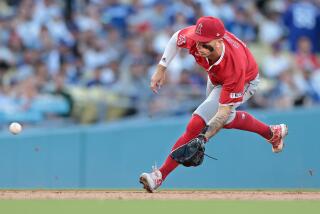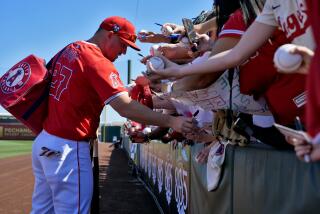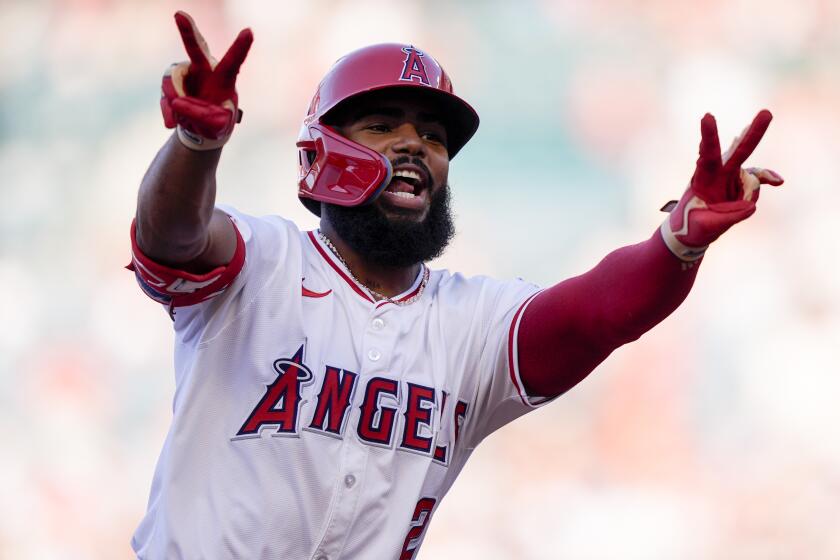ALL-STAR GAME FLASHBACK : HEADY DAYS : Memorable 1979 Was Season That Changed Everything for Angels’ Downing
- Share via
In a 15-year career that might best be described as kamikaze, Brian Downing of the Angels has crushed a thousand baseballs, crashed a hundred walls, died a dozen baseball deaths and played one memorable All-Star game back in 1979.
Now, if he could only remember it.
Downing approached that game at Seattle’s Kingdome the way he approached life--headfirst.
Naturally, there was something to prove. Downing was a .246 career hitter at the start of the 1979 season but had astounded the baseball world before the All-Star break with his batting average of .352, best in the major leagues.
The National Leaguers weren’t sure what to make of Downing when he first approached the plate in the eighth inning with those Coke-bottle lenses and that crazy, open stance he was using then.
So, the National Leaguers made fun of him. They were like that in those days, having won seven consecutive All-Star games and 15 of the last 16.
Downing could almost hear the whispers as he approached the plate:
You mean, we put in all these air miles to get here and this is your league’s top hitter? We should’ve mailed it in. The score was tied, 6-6, when Downing planted his feet in the box and stared out to the mound at Chicago’s Bruce Sutter, the most menacing relief pitcher of his era.
Sutter smiled and whizzed two split-fingered fastballs past Downing for strikes.
“I remember the guys yelling at me from their bench about it,” Downing recalled. “It was like ‘You don’t see that over there,’ because I was leading the league and all that. Then he threw me another one and I hit it up the middle.”
With no outs, Downing had started an American League rally. Bruce Bochte sacrificed Downing to second. Sutter walked Reggie Jackson intentionally and then struck out Bobby Grich on four pitches.
Graig Nettles stepped up with two out and singled to right field, where Pittsburgh’s Dave Parker roamed. Downing came barreling around third base. Parker came up throwing. Catcher Gary Carter awaited the collision at home plate.
Downing picks it up from there:
“The hit was shallow to right. It was right to him. With two outs, you got to try it. Carter was behind the plate. I saw the throw was up, so I thought I could (go in) headfirst and catch the front of the plate with my hand. But as I was in the middle of my slide, (Carter) stepped forward with his foot and I hit into his ankle.”
Downing crashed into Carter and was tagged out. The National League won the game in the ninth on Ron Guidry’s bases-loaded walk to Lee Mazzilli.
Parker, who had already thrown out a runner at third base in the seventh, ended up with the game’s most-valuable-player award.
Downing ended up with an aching head.
“I was already hurt,” he remembered. “I messed up my ankle in the last game before the break. I was concerned I wasn’t even going to get to play. But if you’re going to get hurt, it might as well be in an All-Star game.”
With such headfirst tactics, it’s little wonder Downing’s only All-Star game appearance has blurred in memory.
“It went way too fast,” he said of the experience. “Before you knew it, it was over. I remember getting introduced on the field before the game started. That was the high point.
“But you hardly even saw anybody, to tell you the truth. They keep you on the go all the time. The fact is, I don’t even have a lot of memories because it happened so fast. We had a luncheon that day, and we didn’t even have hardly any batting practice.
“Before you knew it, it was introduction time, the game was going, and then it was over. By the time the game had ended, I came in and half the team was already gone, catching their flights to their next city. It was a whirlwind.”
Kind of like Downing’s 1979 season, one he’ll never forget. That year changed his career and probably kept him in baseball. Downing, after all, had to do something. He was coming off a .255 season with only seven home runs in 412 at-bats.
Downing had always toyed with the idea of weightlifting, but had long heard the myths about excess bulk reducing the flexibility necessary to swing a bat effectively.
Downing wondered what he had to lose.
“If I don’t, I’m done,” he reasoned. “So I’ll give it a shot.”
Lifting did more than increase body mass. It lifted Downing’s spirits.
“The self-confidence thing was the main benefit,” he said. “That wasn’t one of my strengths. It never has been. But it was more so back then.”
When the bulked-up Downing reported to spring training in 1979, pitcher Nolan Ryan asked why he was wearing his chest protector underneath his uniform.
But that wasn’t the end to the new Brian Downing. Over the winter, in a batting cage he had built in his back yard, Downing experimented with a strange new batting stance.
Instead of lining his left foot up with the pitcher’s mound, Downing opened his stance so far it appeared he was awaiting a pitch from the third baseman. Downing kept the foot steady until the pitch was delivered, then moved it back to a normal position.
There was a method to this madness.
“I was wearing glasses in those days,” said Downing, who has since switched to contact lenses. “Out of my conventional stance, I had a little blind spot up around 10 o’clock. I was losing track of the ball, which was making my shoulder pull out a little bit. I was fooling around in the cage and the stance kept getting wider and wider and wider. Then I got a real good look at the ball.”
Downing also opened up because it made it easier to lay off the outside fastball, which he was fed regularly.
“Being a dead-pull hitter, they were always pitching me away,” he said. “And I’d always hit the ball to the shortstop. That’s why I was hitting .240.”
Downing looked like a contortionist at the plate, and could attempt something so daring because he had the reflexes of a 28-year-old.
“And just for that one year, I had great timing, which is what’s necessary when you move that much,” he said. “My timing was right on for the whole year. The next year it wasn’t.”
Downing started taking the outside pitch to right field for base hits. He figured there was plenty of power behind him in Don Baylor, Bobby Grich and Dan Ford, each of whom drove in at least 100 runs in 1979.
But no one imagined Downing would finish the season at .326, the third-highest average in the American League behind Fred Lynn’s .333 and George Brett’s .329. Downing’s average was tops in the league by a right-handed hitter. He finished with 166 hits, 12 homers and 75 RBIs.
Downing, not unexpectedly, said he never gave the race for the batting title a second thought.
“I never thought of myself in that regard,” he said. “I was thinking more about the playoffs.”
The Angels, of course, won their first divisional title that season, with plenty of help from Downing.
“It was fun because it was the first time we’d won here,” Downing said of his season. “That was the overriding thing. It wasn’t personal so much. We had a lot of guys who had tremendous years. The night we clinched it was one of the high points of my career. It was so exciting around here.”
Seasons and stances changed, though, and there never was another season like 1979. Or another All-Star appearance. But he’ll always have Seattle.
“They (pitchers) adjust so you have to adjust,” he said. “And the makeup of our team changed. I became an outfielder as opposed to a catcher, and I got a little stronger. They decided I should go for extra bases a little more.”
Downing hasn’t hit .300 in 10 years, but his work ethic and frequent style changes have made him the most consistent Angel hitter of the 1980s. He has lifted his lifetime batting average 20 points since 1979, from .246 to .266, and has hit 20 or more homers in six seasons, including the last five.
Downing holds nearly every significant all-time Angel hitting record, including runs scored, doubles, home runs, RBIs, extra-base hits and total bases.
And at 38, he’s still messing with his stance and changing his swing every other day or so, like a man who’s afraid his next out may be his last.
“People say, ‘Why don’t you go to right field anymore?’ ” Downing said. “Well, I don’t have those types of pitches to hit anymore. What was my strength is now my weakness. As you get older, your pluses and minuses change. They change drastically.”
More to Read
Go beyond the scoreboard
Get the latest on L.A.'s teams in the daily Sports Report newsletter.
You may occasionally receive promotional content from the Los Angeles Times.







